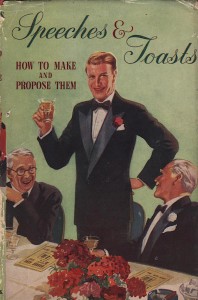 Found in Speeches and Toasts by Leslie F Stemp ( 1952) is a chapter on ‘’certain besetting carelessnesses of dictum from which even our high-brows are not immune”.
Found in Speeches and Toasts by Leslie F Stemp ( 1952) is a chapter on ‘’certain besetting carelessnesses of dictum from which even our high-brows are not immune”.
Although none of the speeches or toasts in the book are as funny as Reginald Perrin’s alcohol induced peroration at the National Fruit Convention, or Hugh Grant’s best man speech In ‘Four Weddings’, Mr Stemp, a barrister for the Gas Board, does provide both mildly amusing and serious examples of speeches for most occasions. And although many remain hopelessly dated, as his use of the word ‘high-brow’ suggests, the advice he offers on grammatical errors remains useful today. Here are some of my favourite examples:
“That” and “which”.
It is wrong to use the relative pronouns” that” and ”which” as if they were interchangeable, and to be varied to meet the demands of euphony. Their provinces are distinct; the boundaries between them well marked. Every defining clause whose antecedent is not a person should be introduced that that, every such clause that adds new matter by which. The test of defining new clauses is: would the suppression of them render the statement untrue? If so it is a defining clause. “We have rejected all the cases that arrived sea-damaged”. Omit the clause and what remains ios a falsehood: all the cases were not rejected: the sound were accepted.” We have received your statement, which is receiving our attention.” Even if this sentence were cut short after “statement”, if would be true. The first sentence, therefore, contained a defining clause, properly introduced by “that” , and the second an added clause , preceded, correctly, by “which”.
“And which “
“ Which itself can mean “and this”. Therefore “and which” is to be avoided except where unescapable , as in: “Her gave me a bat, which I accepted gratefully, and which exactly suited me”. Delete the second “which” and the first would be at once the accusative of the verb “gave” and the nominative of “suited”, and grammatically, this must not be. The second ”which”, therefore, is necessary and it can be introduced in no other way that by “and”.
Unrelated participles.
The mention of active participles suggests our old friend the unrelated participle. “Entering the field it was evident that the home team was losing.” Who was entering the field? We must be told.
Wrong by choice.
Many sin with their eyes open in the use of “every” and “none”, following them by a plural word, which they know is forbidden, to avoid the otherwise inevitable “he and she”, as “Everyone must do what they can” in preference to “he or she can”. But there is ample warrant for using the masculine as the common gender. If the context makes this impossible, and you can’t say “what he can” drop the “everyone” and say “All must do what they can.” Our language badly needs a third person singular that means specifically “he or she”.
My particular bugbears in broadcast journalism include “enormity”, used to refer to a memorable event. According to the Shorter Oxford Dictionary the word actually means a ‘monstrous wickedness ‘. Another is “reticent”, which quite a few broadcasters, who ought to know much better, use incorrectly to mean reluctant. The word actually means ‘disinclined to speak freely‘. [R.M.Healey]
